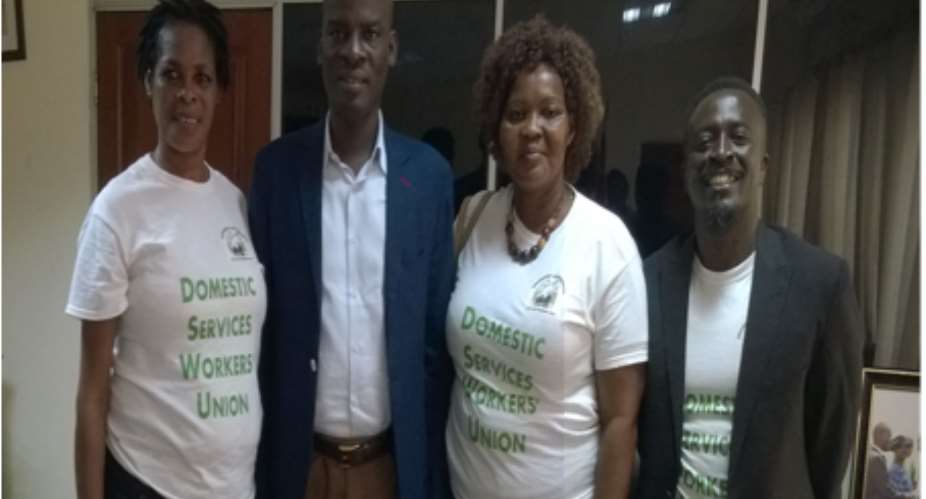The Minister for Employment and Labour Relations, Hon. Haruna Iddrisu has assured domestic workers of government’s commitment to help resolve challenges in their sector through policies that sanitize their employment relationships.
He gave the assurance when a three-member delegation from the Domestic Services Workers Union (DSWU) of TUC Ghana paid a courtesy call on him in Accra.
The delegation included Sis. Esther Kosi, General Secretary, Sis. Eva Attakpah, National Chairperson, and Amewuga Ablordeppey, Administrator.
According to the Minister, this commitment is seen in government’s promulgation of the Labour (Domestic Workers) Regulations 2016, which he last week appended his signature to.
Hon. Iddrisu said government recognizes the tremendous economic input made by domestic workers that was why steps were being taken to ensure that the rights and conditions surrounding their work are safeguarded.
On her part, Sis. Esther Kosi said the DSWU was grateful to the Minister for ensuring that the Regulations covering domestic work was promulgated, considering that the processes for the formulation of the Regulations began in 2011 under former Labour Minister, Hon. E. T Mensah.
She said the Union will uphold the tenets of the Regulations, particularly for domestic workers underthe DSWU membership while making efforts to reach out to those yet to be organized.
The purpose of these Regulations is to protect domestic workers and encourage the formalization of the employment relationship between domestic worker and an employer; Recognize the labour rights of a domestic worker; andRecognize domestic work as a decent and adequately remunerated employment.
Contents of the Regulations comprise six sections and 21 subsections relating to Contract of Employment; Wages and Benefits; Maximum Hours, Rest Periods, and Leave; Rights at Work; Monitoring and Compliance; and Miscellaneous Provisions.
The DSWU, which is a year old, had its Founding Conference on September 23, 2015, making Ghana the latest African country to join other nations with domestic work unions.
In 2011, the International Labour Organisation (ILO) adopted Convention 189 on Decent Work for Domestic Workers,and Recommendation 201 which domestic workers around the world have used to organize themselves into trade unions.
DSWU is also an affiliate of International Domestic Workers Federation (IDWF) and International Union of Food (IUF) through whose support the Union was formed. The courtesy call was powered by the FNV/IDWF Project on Protecting Domestic Workers Rights Through Strong Organisations.





 Dumsor must stop vigil part 2: We’ll choose how we demonstrate and who to partne...
Dumsor must stop vigil part 2: We’ll choose how we demonstrate and who to partne...
 2024 elections: NDC stands on the side of morality, truth; NPP isn't an option —...
2024 elections: NDC stands on the side of morality, truth; NPP isn't an option —...
 Akufo-Addo has moved Ghana from 'Beyond Aid' to ‘Beyond Borrowing’ — Haruna Idri...
Akufo-Addo has moved Ghana from 'Beyond Aid' to ‘Beyond Borrowing’ — Haruna Idri...
 Train crash: NDC is full of evil mindset; driver who 'deliberately' parked the c...
Train crash: NDC is full of evil mindset; driver who 'deliberately' parked the c...
 Dumsor: Energy Minister must be fired; it’s becoming unbearable — IES
Dumsor: Energy Minister must be fired; it’s becoming unbearable — IES
 #DUMSORMUSTSTOP: IMANI responds to Yvonne Nelson's call for a joint vigil
#DUMSORMUSTSTOP: IMANI responds to Yvonne Nelson's call for a joint vigil
 'Obiara b3didi' — Manhyia South NPP Chairman fights for resourcing of NPP grassr...
'Obiara b3didi' — Manhyia South NPP Chairman fights for resourcing of NPP grassr...
 Dumsor: This thing is becoming unbecoming, collapsing our business — Nana Ofori ...
Dumsor: This thing is becoming unbecoming, collapsing our business — Nana Ofori ...
 Dumsor: It'll be no more by the end of April — Gideon Boako assure Ghanaians
Dumsor: It'll be no more by the end of April — Gideon Boako assure Ghanaians
 "I can now see clearly with my two eyes, thanks to the generosity of Afenyo-Mark...
"I can now see clearly with my two eyes, thanks to the generosity of Afenyo-Mark...
